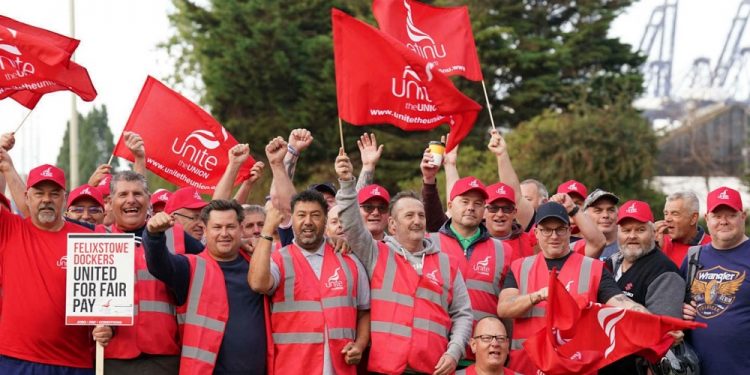By Miguel Lamas, a leader of the IWU-FI
31 August 2022. Amid the world capitalist crisis and its grave consequences for the working people, on whom the governments are trying to unload all the burden, strikes are multiplying in Europe and the United States. And the working class in the UK is staging the biggest strikes in many decades.
The UK, one of the most important imperialist countries, is in its worst crisis since WW II. Inflation could reach 13 percent this year. This, from Argentina, may not seem much, but it is extremely serious in the UK with semi-frozen wages. Real wages are the lowest in decades. But that is not all. The National Health System is getting worse and worse, with low salaries and a lack of staff. The freeze and reduction in investment since 2010 have meant that it now has one of the lowest numbers of hospital beds per person in a developed country, something that suffered from patient neglect during the pandemic. And the increase in electricity and gas prices (in the hands of private companies) exceeds 80 percent. Petrol prices have risen by over 40 percent.
Added to this is the political crisis. Conservative Prime Minister Boris Johnson resigned in June and only on 5 September will a replacement be appointed, who will be another Conservative appointed by Parliament, with plans to cut public spending even further. Faced with this, popular disapproval is already growing and any new prime minister will have almost no support.
One of the most important media outlets, the right-wing “Daily Telegraph” notes in the article by columnist Allister Heath: “Our astonishingly rapid decline is tragic and yet unsurprising. We are close to the denouement, the endpoint, of a quarter century of political, intellectual and moral failure in which most of our political class are complicit”.
This is from the conservative media, therefore supporters of the liberal-conservative capitalist economic model consolidated by Margaret Thatcher. Today’s deep crisis has its origins many years ago, even if today it is aggravated by the pandemic and the war in Ukraine. For example, the water crisis is directly related to the privatisation of the water company and the lack of jobs. The crisis in public health is because of the decline in its budget.
Thatcher attacked labour rights, privatised much of the public enterprises and restricted the right to strike. A general strike would be illegal in the UK today. And each partial strike can only be called after a lengthy process that ends in a secret ballot of union members, to approve or disapprove of the strike.
The Labour Party that governed between 1997 and 2007 under Tony Blair, totally subordinated to big capital, was far removed from the working class that founded it from its trade unions a century ago and maintained the same capitalist policies.
Strikes break out
Tens of thousands of workers are on strike, led by the 40,000 RMT workers on the railways, who have already struck several times in recent months, and the thousands of workers on buses, the underground, the Post Office, and the Unite dockers’ union at the Port of Felixstowe. Earlier airline workers walked out, cancelling thousands of flights. There are also strikes in factories, health and education sectors. All are demanding wage increases in line with inflation.
The general secretary of the RMT rail union, Mick Lynch, warned that the current unrest could lead to a de facto general strike (the last one was in 1927). “That’s for the workers’ centre to decide. But what we are going to see in education, health, transport, and the private sector is synchronised strike action.”
The possibility of a general strike is on the table, although it is not allowed by law. This could open up a new perspective for the British labour movement. As in many countries of the world, the workers see that none of the capitalist parties is giving them solutions. The need to win a government of the working people arises.
From the IWU-FI, we call for solidarity with the struggle of British workers to triumph and to follow their example in Europe and the world.
Tax cuts for capitalists
Since Thatcher, besides privatisation, the idea of lowering taxes for big capital to the minimum was imposed under the pretext of “facilitating investment”. The same falsehood that they would have us believe in Argentina and almost all countries.
This has become even more acute since the 2008 crisis. Today, the UK has one of the lowest tax rates but is at the bottom of the table for private and public investment in the G7 countries.
An obvious example is the case of water. The drought this summer left much of the country with restricted water use, because privatised water service companies in the 1980s have built no new reservoirs, even though there was a population increase of ten million people in recent decades, nor was there any maintenance work. The large profits of these companies, augmented by low taxes and higher fees, were used to pay dividends to shareholders: the equivalent of over seventy billion dollars in the last thirty years. These super profits at the cost of low taxes and fewer labour rights go to speculative investments in “tax havens” or to Asian countries with a very low labour force of less than $100 a month.
The economic editor of the newspaper The Guardian denounces this lack of productive investment in Britain: “In the UK we work much more than in Germany and France but we are far behind in terms of productivity because we invest much less in key areas including technology, training and research”.













